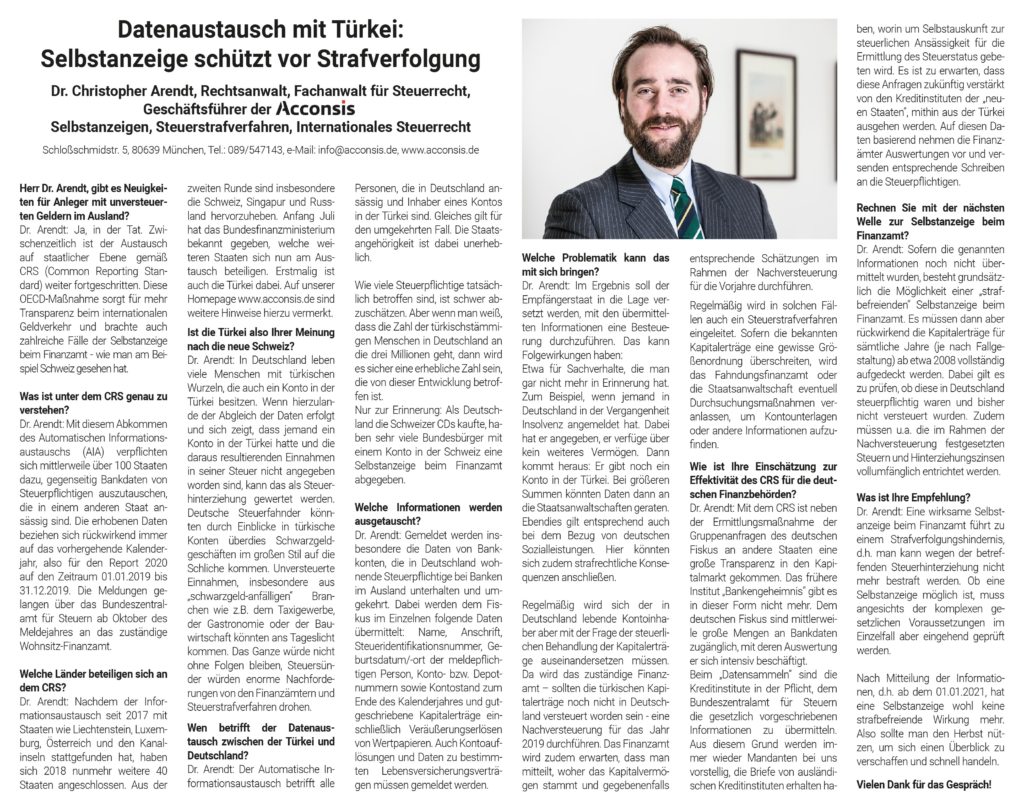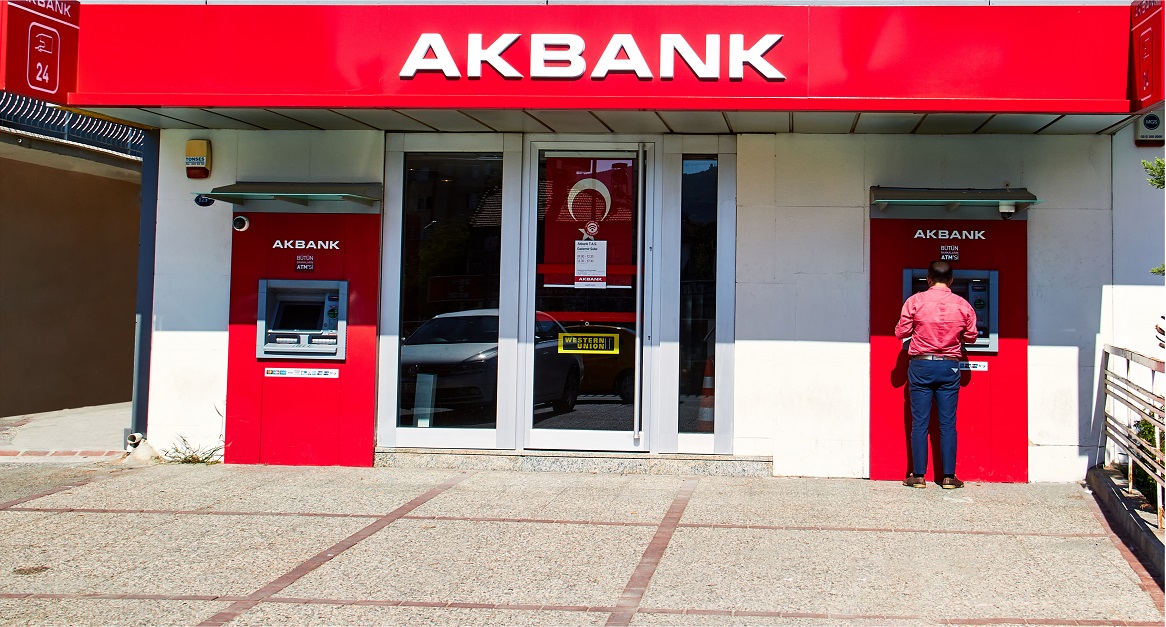To the topic data exchange (with Turkey) the Bavarian broadcast reports on the topic “tax evasion: Turkey also reports soon account data” on B5 aktuell, as well as the BR24 App.
The contribution is based on an interview on the current situation with Dr. Christopher Arendt, specialist lawyer for tax law of ACCONSIS in Munich. Dr. Christopher Arendt explains in detail
- who is affected by data exchange with Turkey?
- what can happen if you do not react in time?
- which experiences and particularities already exist with Turkish clients?
All information of the BR contribution, as well as the entire interview.
Will Turkey become the new Switzerland?
Steuerhinterziehung:
Auch Türkei meldet bald Kontodaten
Beitrag BR24/ Bayerischen Rundfunk
vom 09.10.2020
Podcast-Beitrag B5 aktuell
Dr. Arendt, who does the exchange of information and data affect?
After various measures for the exchange of information on financial matters between European and non-European countries have already taken place in the past, the implementation of the Common Reporting Standard (CRS) has led to a significant improvement in data exchange from the point of view of the tax authorities.
In principle, this data exchange can affect persons who, regardless of their citizenship, have a residence in Germany and maintain an account abroad. The data exchange takes place reciprocally, so that the partner countries also receive corresponding information from Germany.
Consequently, the data exchange is not limited to Turkey – for the year 2020 the data exchange will take place between 110 countries, and Turkey will be a participant in the international agreement for the first time in 2020. In principle, Turkey would then be obliged to transmit the data retroactively for the 2019 assessment year. Whether this contractual obligation will actually be met vis-à-vis all parties to the agreement will probably not be revealed until the end of 2020 (because that is when the data must be reported).
Can you anonymously describe a typical case?
I would be happy to put this into concrete terms using a case that regularly occurs in practice.
A person living in Germany has received money gifts or an inheritance in another country due to family connections, let’s take Turkey as a synonym here for current events. The money received in Turkey, the person has then invested in an account at a bank in Turkey and draws interest or maintains a deposit there. One can vary this case naturally, the invested money does not come from a donation, but from the enterprise of a trade etc. Frequently the money is also not put on on a bank account, but invested to the renting against payment into a house.
What threatens if those affected do not act proactively? Why is head in the sand put no good idea?
That depends on the individual case, of course. The past has shown that the exchange of data works better and better. Hoping that you are not part of the information exchange is therefore not good advice.
In the worst case, criminal tax proceedings can be initiated in Germany in connection with the money invested abroad and subsequent taxation can take place. Whether such legal consequences are imminent should be checked if possible before the tax office contacts the persons concerned. With timely awareness of the problem, the damage can usually be limited.
How do the authorities proceed in this case? What are parallels, what is different compared to Switzerland?
We are currently experiencing the first effects of data exchange on the basis of CRS retroactively for the year 2016. According to official information, the Federal Central Tax Office is currently evaluating 1.1 million exchanged data on persons living in Germany.
By way of central evaluation, the cases are forwarded to the individual domicile tax offices. These then send standardized letters to the taxpayers (usually no longer than one page), in which they are informed that they have knowledge of an account in another country (e.g. Austria). In addition, one is regularly asked to explain where the funds invested abroad come from.
Parallels and differences
First of all, with the RSP we have a completely new data quality.
In fact, at the height of the self-reports in connection with Switzerland, the tax authorities had comparatively little information. I think we all still remember the actions of the then Minister of Finance of North Rhine-Westphalia and now party leader of the SPD, Mr. Walter-Borjans, who purchased data from Swiss bank employees. At that time, the press was regularly told which banks the information came from. After the publication by the press, self-denunciations were received in immediate succession from investors in the financial institutions concerned.
Since this year (retroactively for 2016), the data have been reported directly by the foreign financial institutions to the Federal Central Tax Office each year. The information density of the data is very extensive. From now on, the following information in particular will be reported annually and automatically:
- Name,
- address and tax identification number,
- date and place of birth,
- tax residence,
- account number,
- Account balance or value at the end of the relevant calendar year
Is there any experience or special features with Turkish clients?
While Germans often invested their capital in Switzerland under currency hedging considerations and anonymity, we have completely different motives with Turkey.
Many Germans have direct family ties to Turkey. They call both Turkey and Germany their home. In the past (around the year 2000) there was even a cooperation with the Turkish National Bank through the Dresdner Bank. At that time, investments in Turkey were aggressively advertised with the prospect of double-digit interest income. It is to have given even an advertising video of the Turkish national bank, in which the tax exemption of the investment yields was announced (Webel PStR 01.09.2005 P. 216). When the German tax authorities drauf came, there was a considerable number of criminal tax proceedings against investors in Turkey. Altogether it is quite comprehensible for me that in Germany living persons in Turkey also investments transacted, which are evaluated possibly now subject of the information exchange and by the German treasury – the question of the taxation of the incomes resulting from it stands on another sheet.
In particular one thinks naturally of the Hawala Banking. In November 2019, money, vehicles, gold and jewelry worth 22 million Euros were confiscated in a nationwide raid against illegal hawala banking. The head of the organization is said to be a Düsseldorf owner of a jewelry chain, who ran the hawala banking business in his jewelry stores and pawn shops in Berlin.
With this example you are of course addressing a completely different dimension.
I continue to assume that we will be talking in the majority of cases in which private investors earn interest or rental income in Turkey and, against the background of the taxation that has already taken place in Turkey, have trusted that the investment income/rental income was not taxable again in Germany. Frequently the capital stock of the plant might have been taxed also already in Germany and transported or transferred personally by the persons concerned into Turkey.
Even if the Hawala Banking is a long tradition and also meaningful origin, it is seen today in connection with money laundering. In this context, we therefore rather talk about “black money”, i.e. untaxed income in Germany.
With the exchange of information, hawala banking can only be countered to a limited extent. According to my information the disbursement of the money paid in Germany is not exclusively done by financial institutions in the recipient country, but also by retailers etc. Such companies are not obliged to make a report in the sense of CRS. The Hawala system will therefore continue to function. Once the money has been transferred abroad, domestic straw men will be hired to hold the accounts or the property for the actual owners on the basis of a trust agreement. In this case, there is no notification under the CRS to Germany because the actual owner of the money is not known to the banking institute. The detection of such cases is due to the implementation of the anti-money laundering regulations in the respective country. I can tell you that I assume that there are major differences in consistent application within the contractual partners of the CRS.
Data exchange with Turkey?
Our expert advises:

Rechtsanwalt
Fachanwalt für Steuerrecht
Geschäftsführer der ACCONSIS
Dr. Christopher Arendt
Selbstanzeigen
Steuerstrafverfahren
Internationales Steuerrecht
Service-Phone
+ 49 89 547143
or by e-mail c.arendt@acconsis.de
My recommendation?
An effective self-denunciation at the tax office leads to an obstacle to prosecution, i.e. one can no longer be punished for the tax evasion in question.
However, whether a self-denunciation is possible must be examined in detail in each individual case in view of the complex legal requirements.
Once the information has been provided, a voluntary disclosure will probably no longer have an exempting effect, i.e. from 01.01.2021. So one should use the time until the end of the year to get an overview and act quickly.
Please do not hesitate to contact me.
I will be happy to assist you with advice.
Further mentions in press releases for information exchange Turkey
- FOCUS Money, Internationaler Steuerbetrug: Steuerfahnder bekommen Zugriff in Türkei – Millionen Menschen in Deutschland betroffen, 15.10.2020
- Münchner Wochenanzeiger, Ausgabe 07.10.2020

Time schedule for implementation of the Common Reporting Standard
According to the OECD list, Status of Commitments,
Status: 16.09.2020, the intended exchange of information should take place by September 2020 at the latest for the following countries:
Anguilla, Argentina, Belgium, Bermuda, British Virgin Islands, Bulgaria, Cayman Islands, Colombia, Croatia, Cyprus, Czech Republic, Denmark, Estonia, Faroe Islands, Finland, France, Germany, Gibraltar, Greece, Guernsey, Hungary, Iceland, India, Ireland, Isle of Man, Italy, Jersey, Korea, Latvia, Liechtenstein, Lithuania, Luxembourg, Malta, Mexico, Montserrat, Netherlands, Norway, Poland, Portugal, Romania, San Marino, Seychelles, Slovak Republic, Slovenia, South Africa, Spain, Sweden, Turks and Caicos Islands, United Kingdom, Andorra, Antigua and Barbuda, Aruba, Australia, Austria, Azerbaijan, Bahamas, Bahrain, Barbados, Belize, Brazil, Brunei Darussalam, Canada, Chile, China Cook Islands, Costa Rica, Curaçao, Dominica, Greenland, Grenada, Hong Kong (China), Indonesia, Israel, Japan, Lebanon, Macao (China), Malaysia, Marshall Islands, Mauritius, Monaco, Nauru, New Zealand, Niue, Pakistan, Panama, Qatar, Russia, St. Petersburg, St. Petersburg, St. Petersburg, St. Petersburg, St. Petersburg. Kitts and Nevis, St. Lucia, St. Vincent and the Grenadines, Samoa, Saudi Arabia, Singapore, Sint Maarten, Switzerland, Trinidad and Tobago, Turkey, United Arab Emirates, Uruguay, Vanuatu, Ghana, Kuwait, Kazakhstan, Nigeria, Oman, Peru
Bundeszentralamt für Steuern,
Aktuelle Liste der teilnehmenden Staaten
Stand: 1. Juli 2020


